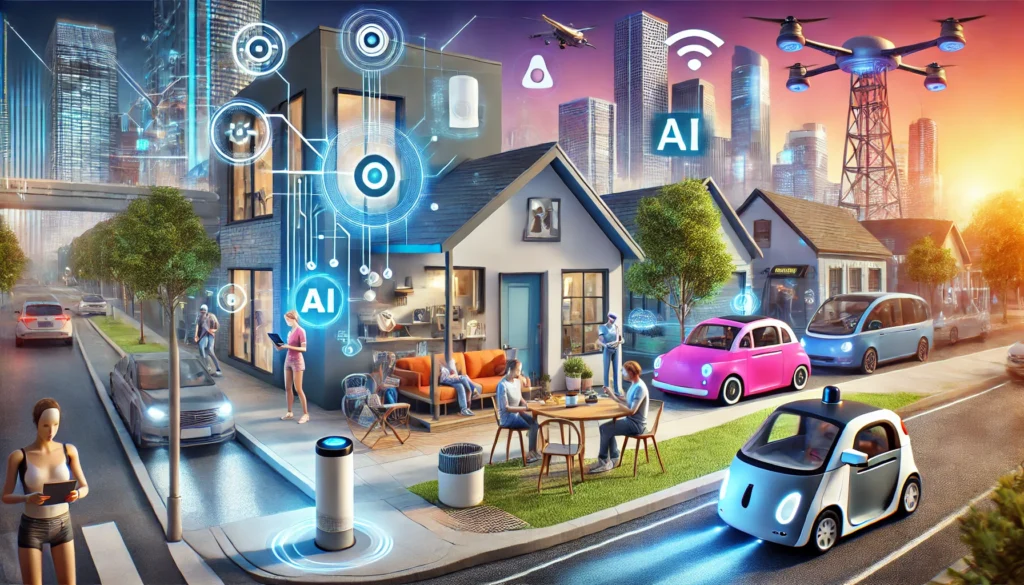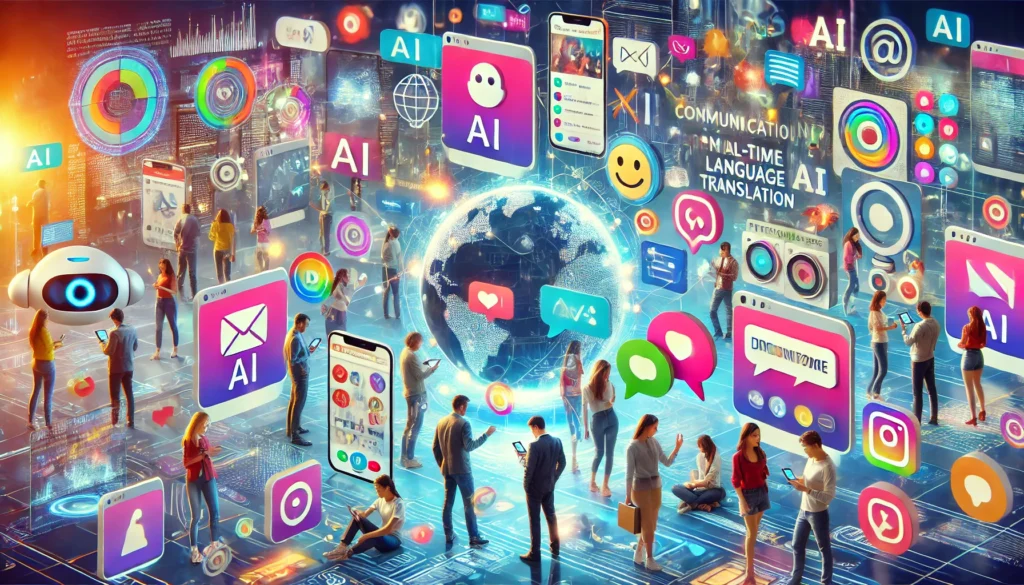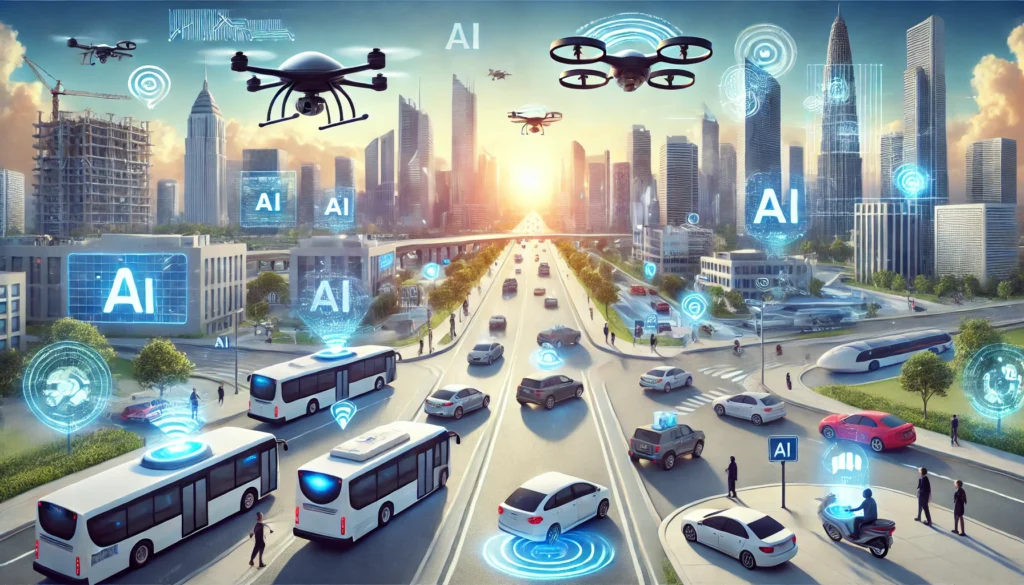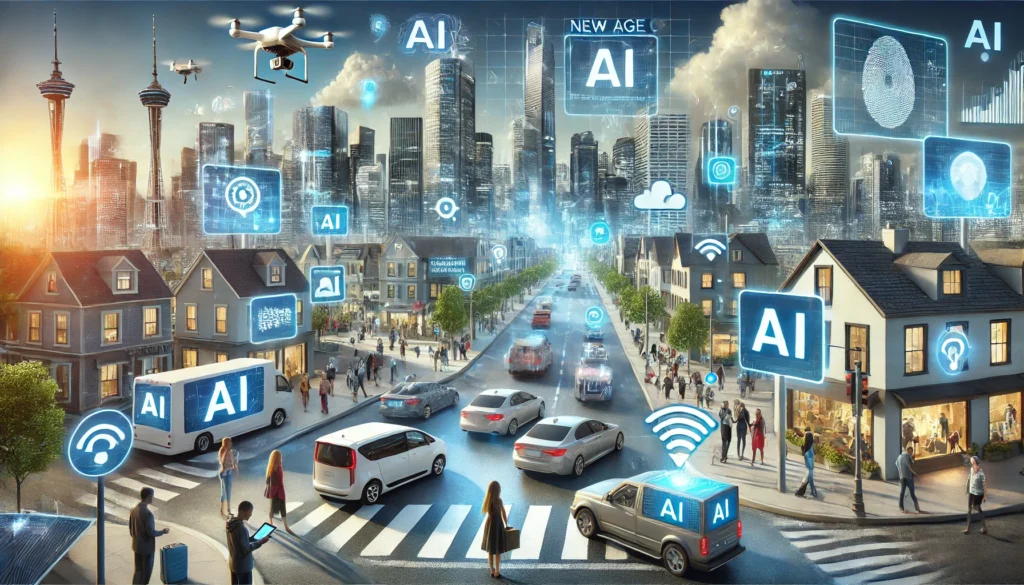The new age of AI is upon us. Once a concept limited to science fiction, artificial intelligence (AI) is now a significant part of our daily lives, revolutionizing the way we work, communicate, and even live. From smart homes to autonomous vehicles, the integration of AI technologies is dramatically reshaping everyday life.
What is AI?
At its core, Artificial Intelligence (AI) refers to machines or software systems designed to simulate human intelligence. These systems are capable of learning, reasoning, and problem-solving through various techniques such as machine learning, deep learning, and neural networks.
- Machine Learning (ML): AI learns from data and improves its decision-making over time.
- Deep Learning (DL): A more advanced subset of ML, inspired by the human brain, for processing vast amounts of data.
- Neural Networks: A network of algorithms designed to mimic the way the human brain works, helping AI systems recognize patterns and make decisions.
The new age of AI has moved beyond experimental stages and is now embedded in everyday experiences, enhancing everything from home automation to business productivity.
The Evolution of AI
In the past few decades, AI has evolved from being an academic curiosity into an essential tool in numerous fields. Initially, AI focused on solving very specific problems—such as playing chess or simple pattern recognition. However, with advancements in computing power and data availability, AI technologies now power critical applications in industries like healthcare, transportation, and entertainment. Over the past decade, we’ve witnessed the new age of AI rise, transforming various sectors and improving the efficiency and convenience of everyday tasks.

AI in Daily Life: Enhancing Convenience
The new age of AI is making daily life more seamless by integrating advanced technologies into the very fabric of our routines. Let’s explore some of the key areas where AI enhances convenience.
Smart Homes and AI Assistants
One of the most significant transformations in daily life comes through AI-powered smart homes. Voice assistants like Alexa, Siri, and Google Assistant have brought AI into our living rooms, allowing us to control everything from lighting and climate to security systems with just our voice.
Smart thermostats, smart lights, and security cameras are all powered by AI, making homes not only more convenient but also more energy-efficient and secure. With AI learning your preferences over time, it adjusts systems to optimize energy usage and enhance home security by detecting unusual activities. The new age of AI in smart homes brings unparalleled comfort and safety into our daily lives.
AI in Personal Devices
AI isn’t just limited to smart homes; it’s also embedded into our personal devices. Smartphones, powered by AI, enhance user experiences through camera improvements, voice recognition, and personalized content recommendations. For instance, AI adjusts your camera settings automatically, optimizing photo quality based on the scene or subject.
Wearable tech such as smartwatches and fitness trackers use AI to monitor your health, providing personalized insights about your fitness goals, heart rate, sleep patterns, and more. The new age of AI is effectively helping individuals manage their health and fitness, offering real-time analysis and advice.
AI-Driven Entertainment
Entertainment has been revolutionized by the new age of AI as well. Streaming services like Netflix and Spotify use AI algorithms to personalize your content recommendations, based on what you’ve watched or listened to before. This personalization enhances user engagement and ensures that every recommendation feels tailored to your preferences.
In gaming, AI has made strides in creating more interactive and adaptive experiences. AI-driven NPCs (non-playable characters) in games now react to player actions, providing a more immersive and dynamic gaming experience.
AI in Communication: Changing How We Connect
Communication is a crucial part of our daily lives, and the new age of AI is making interactions smarter and more efficient.
AI in Social Media
Social media platforms have been using AI for years to curate user feeds and deliver more relevant content. AI-powered algorithms analyze user behavior and interactions, tailoring each feed to show posts that are most likely to engage the individual. Additionally, facial recognition technology on platforms like Facebook ensures that photos are automatically tagged.
The new age of AI enables social media platforms to provide a personalized, engaging experience for every user, while also making advertising more effective for businesses.
Chatbots and Customer Service
AI-powered chatbots are now commonplace in customer service, from e-commerce sites to banking platforms. These bots provide instant responses, answer frequently asked questions, and even resolve complex issues. This leads to improved customer satisfaction and shorter response times.
The new age of AI in customer service is helping businesses operate more efficiently while simultaneously improving the consumer experience.
AI in Language Translation
Language barriers are becoming less of a concern thanks to AI-powered language translation tools. Apps like Google Translate and iTranslate provide real-time translations, making it easier for people from different countries to communicate. These tools are crucial for international travel, business, and education, helping bridge the communication gap in a more accessible way. The new age of AI makes global communication effortless and inclusive.

AI in Work and Productivity: Shaping Professional Landscapes
The new age of AI is having a profound impact on the workplace, automating mundane tasks and fostering creativity.
AI in the Workplace
In the workplace, AI is transforming how we approach productivity. AI tools are now capable of automating repetitive tasks like scheduling, data analysis, and email management, freeing up time for employees to focus on high-value activities.
In the HR sector, AI is used to screen resumes, identify top candidates, and track employee performance. The new age of AI enables companies to make smarter, data-driven decisions.
AI in Creative Industries
AI is also having a transformative impact on creative industries. AI-powered tools like Adobe Sensei help designers and video editors automate processes like color correction, object recognition, and photo enhancements, speeding up workflows. Similarly, AI is being used in music composition and scriptwriting, helping artists generate ideas, melodies, and narratives.
Improving Efficiency in Remote Work
With the rise of remote work, AI has become indispensable. Virtual assistants powered by AI help manage calendars, coordinate meetings, and track progress. AI is also enhancing virtual meetings with features like automatic transcription and summary generation. The new age of AI is ensuring that remote teams stay productive and connected, no matter where they are.
AI in Healthcare: Saving Lives and Improving Well-Being
AI’s applications in healthcare are perhaps the most impactful. The new age of AI has the potential to save lives, improve patient care, and make healthcare more efficient.
AI in Diagnostics
AI-driven algorithms are revolutionizing healthcare by improving diagnostic accuracy. Machine learning models can analyze medical imaging (such as X-rays and MRIs) to identify patterns that may indicate diseases like cancer or heart conditions. This early detection enables faster treatment and improves patient outcomes.
Personalized Healthcare
AI is helping provide personalized healthcare by recommending tailored treatment plans based on an individual’s unique needs and medical history. AI-powered apps track everything from fitness goals to medication schedules, helping individuals manage their health more effectively.
Mental Health Support
Mental health support is also being revolutionized with AI-powered chatbots. Tools like Woebot provide emotional support and cognitive behavioral therapy to help users manage anxiety, depression, and stress. The new age of AI is playing a critical role in mental well-being by offering scalable and accessible support.

AI in Transportation: Shaping How We Move
The new age of AI is making transportation more efficient and safer.
Autonomous Vehicles
Self-driving cars and trucks are one of the most exciting advancements in transportation. AI algorithms power autonomous vehicles, enabling them to navigate roads and traffic without human intervention. These vehicles are expected to reduce accidents caused by human error, optimize traffic flow, and make transportation more sustainable.
AI in Traffic Management
AI is also helping to reduce traffic congestion. Smart traffic systems analyze real-time traffic data to adjust light timings, optimize routes, and reduce waiting times for drivers. The new age of AI is making cities more efficient and environmentally friendly.
Conclusion
The new age of AI is changing the way we live and work in profound ways. From making daily tasks more convenient to transforming entire industries, AI is reshaping the future. As we continue to embrace these advancements, it’s important to stay informed and responsible in our use of AI, ensuring it benefits society as a whole.
FAQs:
1. How does AI impact daily life?
AI enhances convenience in daily life by automating tasks, improving personalized experiences, and streamlining communication.
2. What ethical challenges does AI pose?
Ethical concerns include privacy issues, algorithmic bias, job displacement, and accountability for AI-driven decisions.
3. Will AI replace human jobs?
While AI automates certain jobs, it will also create new opportunities, particularly in fields like AI development and robotics.
4. How is AI changing healthcare?
AI is transforming healthcare by improving diagnostics, personalizing treatment plans, and offering mental health support through chatbots.
5. What’s the future of AI?
The future of AI includes advancements in quantum computing, AI-human collaboration, and solving global challenges like climate change.



